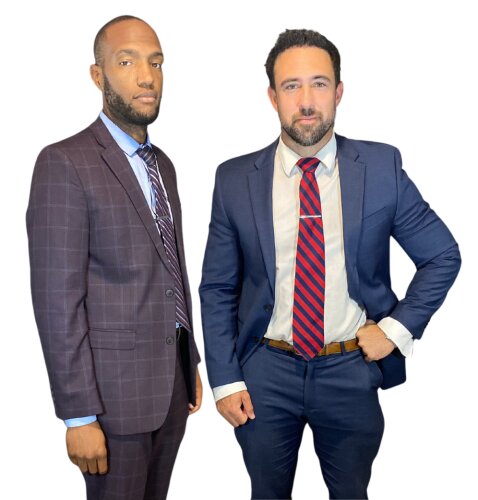Best Permanent Residency Lawyers in Florida
Share your needs with us, get contacted by law firms.
Free. Takes 2 min.
Or refine your search by selecting a city:
List of the best lawyers in Florida, United States
About Permanent Residency Law in Florida, United States
Permanent residency in Florida, as in the rest of the United States, refers to a non-citizen’s legal right to live and work in the country indefinitely. Individuals who obtain permanent residency are commonly known as green card holders. While immigration law is primarily governed at the federal level by United States Citizenship and Immigration Services (USCIS), your experience as a permanent resident will be affected by state-specific matters in Florida such as employment, driver’s licenses, state benefits, and local government interactions. Living in Florida means encountering unique local considerations, such as state documentation requirements, interactions with local authorities, and the robust immigrant communities throughout the state.
Why You May Need a Lawyer
Immigration law can be complex, and pursuing or maintaining permanent residency in the United States often involves extensive documentation, strict deadlines, and many legal nuances. Common situations where people seek legal help include:
- Navigating the green card application process for family or employment-based reasons
- Facing delays or denials in a permanent residency application
- Seeking to adjust status while in the United States on another visa
- Dealing with accusations of fraud or misrepresentation in immigration matters
- Defending against removal or deportation proceedings
- Applying for waivers due to prior immigration violations or inadmissibility
- Understanding how Florida law interacts with federal immigration status, such as when applying for state benefits or licenses
- Preparing for naturalization and understanding how past actions as a resident may affect eligibility
An experienced immigration attorney can help avoid costly mistakes, interpret complex laws, and represent your interests in interactions with USCIS and local agencies.
Local Laws Overview
While permanent residency is federally regulated, there are aspects of Florida law that can impact a resident’s experience:
- Driver’s Licenses and ID Cards: Florida allows permanent residents to obtain state IDs and driver’s licenses by presenting their green card and other required documents. The application process and compliance requirements are specific to the state.
- State Benefits: Certain state benefits, such as in-state tuition, healthcare access, and other public assistance programs, may have specific residency requirements or waiting periods. Permanent residents in Florida should review eligibility rules.
- Employment: While a green card allows employment anywhere in the United States, Florida employers may require proof of residency status for onboarding purposes. The state also has regulations to protect workers from discrimination based on immigration status.
- Law Enforcement and Immigration: Florida law enforcement agencies sometimes collaborate with federal immigration authorities. Understanding your rights during local interactions is important for permanent residents.
- Taxation: Permanent residents in Florida generally have to comply with federal and state tax laws. Florida has no state income tax, but there may be specific reporting obligations.
Frequently Asked Questions
What is a permanent resident?
A permanent resident is a non-citizen authorized to live and work in the United States indefinitely. They are issued a green card as proof of their status.
How can I apply for a green card while living in Florida?
You may be eligible to apply through family-based sponsorship, employment, refugee or asylum status, or other special programs. The application is made to USCIS, often involving documentation and interviews at local Florida offices.
Can I lose my permanent resident status?
Yes, you can lose your status for reasons such as remaining outside the United States for too long, committing certain crimes, or violating immigration laws. Legal advice is recommended if you are concerned about your status.
Can permanent residents in Florida receive state benefits?
Permanent residents may qualify for some state benefits, but eligibility rules and required waiting periods may apply. Contact the particular agency for details.
How do I renew or replace my green card in Florida?
You must file a renewal or replacement application (Form I-90) with USCIS. While this is a federal process, you may attend biometrics or interviews at Florida-based USCIS offices.
What rights do permanent residents have in Florida?
Permanent residents can live and work anywhere in the United States, own property, attend public schools, and qualify for some state and federal benefits. They cannot vote in federal elections or serve on juries.
How long must I be a resident before applying for citizenship?
Most permanent residents must wait at least five years before applying for naturalization, or three years if married to a U.S. citizen, subject to other requirements.
What should I do if my green card is lost or stolen while in Florida?
File a police report if necessary, and promptly submit Form I-90 to USCIS to replace your green card. You may also want to consult an attorney.
Do Florida law enforcement agencies have access to my immigration status?
Law enforcement may access certain federal databases, and some cooperation with immigration authorities exists. Know your rights regarding privacy and what you must disclose.
Where are USCIS offices located in Florida?
USCIS has several offices throughout Florida, including Miami, Tampa, Orlando, Jacksonville, and Fort Myers. You may be required to appear in person at one of these locations for certain appointments.
Additional Resources
There are a number of resources available for individuals seeking guidance or legal assistance regarding permanent residency in Florida:
- United States Citizenship and Immigration Services (USCIS) for official forms and status checks.
- Florida Bar Association - Find immigration attorneys with experience in your region of Florida.
- Florida Immigrant Coalition - Advocacy and support for immigrants throughout the state.
- Local legal aid organizations such as Florida Legal Services and Catholic Charities, which may offer free or low-cost immigration assistance.
- Local community groups and support centers serving Florida’s diverse immigrant population.
- Florida Department of Highway Safety and Motor Vehicles for information on driver's licenses or state identification.
Next Steps
If you need legal assistance with permanent residency in Florida, consider the following steps:
- Collect all relevant documents, such as your green card, passport, prior immigration paperwork, and any correspondence with USCIS.
- Determine the specific issue or question you need help with, for example, applying anew, renewing your status, or responding to a notice.
- Research qualified immigration attorneys or legal aid providers in your area.
- Prepare questions in advance for your consultation to make the most of the meeting.
- Follow up on your attorney’s recommendations and ensure you meet all necessary deadlines.
- Stay organized by keeping records of your communications, filings, and notices from immigration authorities.
Taking these proactive steps can help ensure your rights and status as a permanent resident are protected under both Florida and U.S. law.
Lawzana helps you find the best lawyers and law firms in Florida through a curated and pre-screened list of qualified legal professionals. Our platform offers rankings and detailed profiles of attorneys and law firms, allowing you to compare based on practice areas, including Permanent Residency, experience, and client feedback.
Each profile includes a description of the firm's areas of practice, client reviews, team members and partners, year of establishment, spoken languages, office locations, contact information, social media presence, and any published articles or resources. Most firms on our platform speak English and are experienced in both local and international legal matters.
Get a quote from top-rated law firms in Florida, United States — quickly, securely, and without unnecessary hassle.
Disclaimer:
The information provided on this page is for general informational purposes only and does not constitute legal advice. While we strive to ensure the accuracy and relevance of the content, legal information may change over time, and interpretations of the law can vary. You should always consult with a qualified legal professional for advice specific to your situation.
We disclaim all liability for actions taken or not taken based on the content of this page. If you believe any information is incorrect or outdated, please contact us, and we will review and update it where appropriate.
Browse permanent residency law firms by city in Florida
Refine your search by selecting a city.
















